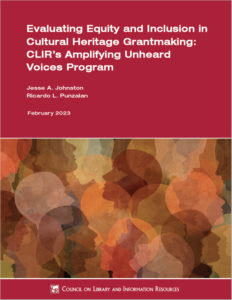The Council on Library and Information Resources (CLIR) is pleased to announce the publication of Evaluating Equity and Inclusion in Cultural Heritage Grantmaking: CLIR’s Amplifying Unheard Voices Program.
When the Mellon Foundation funded the first iteration of the Amplifying Unheard Voices (DHC:AUV) program in 2020, its officers encouraged CLIR to contract with an external research team to undertake a comprehensive program evaluation. The Foundation’s support gave CLIR its first opportunity to commission a formal assessment of its regranting activities since the launch of the organization’s earliest “hidden collections” call for proposals in 2008.
CLIR subsequently hired Jesse Johnston and Ricardo L. Punzalan to conduct an in-depth documentation review, focus groups with program stakeholders, and more than fifty interviews with applicants. The team’s methods and the results of their investigations are summarized in the report. Their findings will inform CLIR’s future work and will be of interest to other organizations seeking to improve access to rare and unique materials, especially those with the potential to deepen public understanding of the histories of people of color and other communities and populations whose work, experiences, and perspectives have been insufficiently recognized or unattended in the past.
“We note the high enthusiasm for increased support of community-based memory initiatives that will diversify the historical record and make that record more digitally available,” write Johnston and Punzalan. “At the same time, the assessment reveals challenges of funding digitization projects in cultural heritage: the significant time required for design, implementation, and management of multiyear programs; the limitations of project grants; and the challenges of making incremental yet responsive changes within a longstanding program.”
“Look around us: consider today the stultifying pressure, loud and angry, to rewrite history from a single perspective, to privilege an exclusive, leeched, and recumbent narrative of our collective legacy. It is core to CLIR’s mission to assure that we work diligently to mitigate these constraints by listening to, sharing, and sustaining the elegant variety of voice and vision that inspirit our communities: the chorus that Hidden Collections strives to amplify, and the new report confirms,” said CLIR president Charles Henry.
The report is freely available on CLIR’s website at: https://www.clir.org/pubs/reports/dhc-auv-assessment/.
The Council on Library and Information Resources is an independent, nonprofit organization that forges strategies to enhance research, teaching, and learning environments in collaboration with libraries, cultural institutions, and communities of higher learning.


